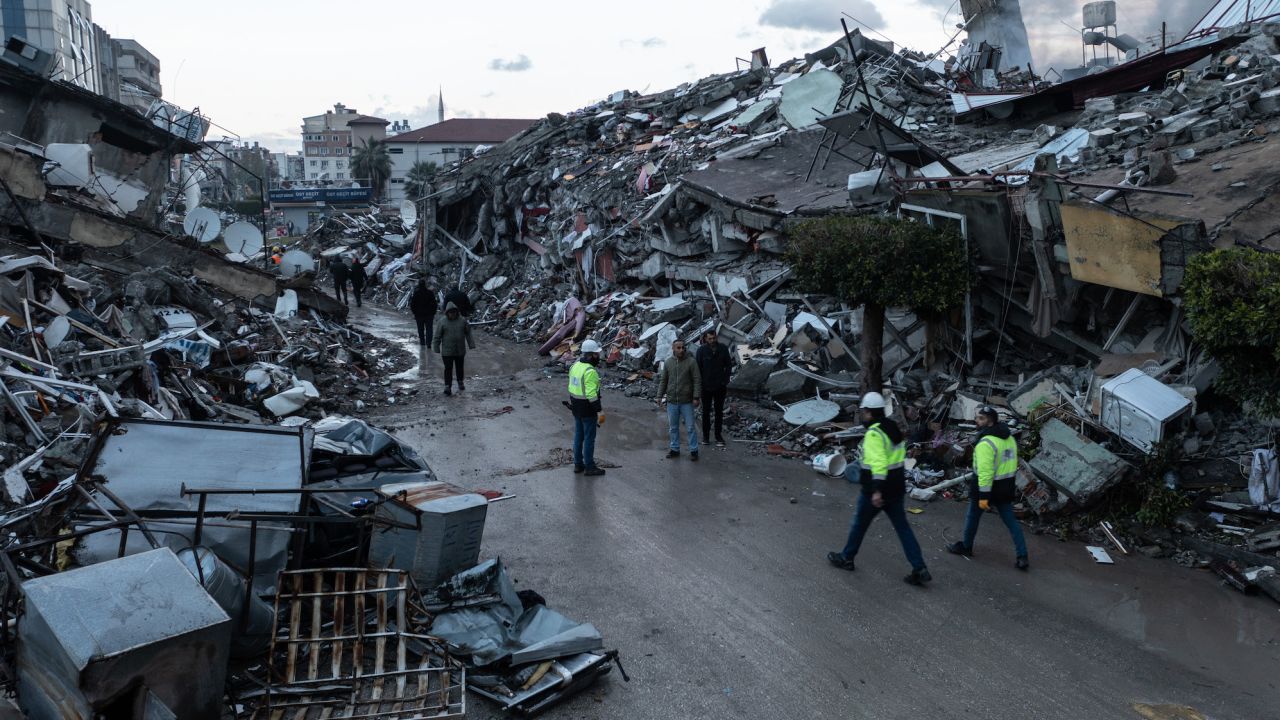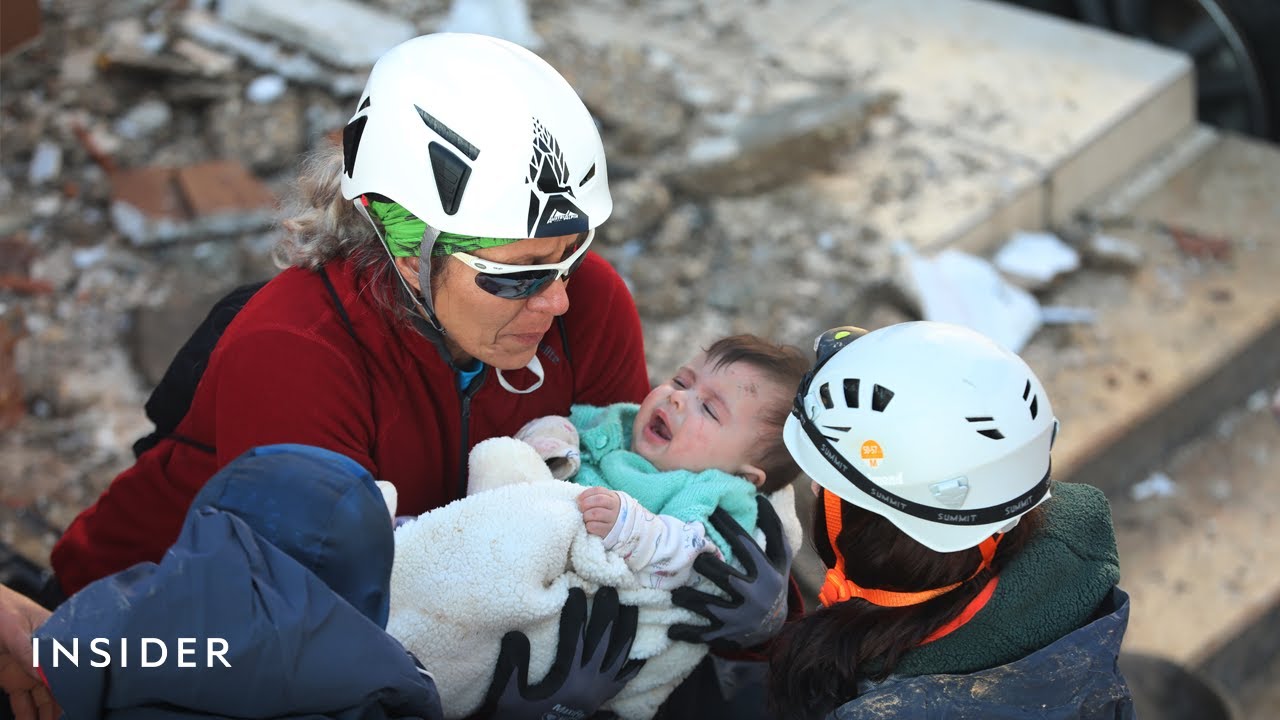More Than 24 Hours After The Turkey Earthquake, Survivors Are Still Being Rescued From The Rubble
The earthquake hits Turkey-Syria border regions on February 7th, 2023 has left a trail of destruction in its wake. More than 24 hours after the disaster, survivors are still being pulled from the rubble, with rescue and recovery efforts continuing.
Author:Suleman ShahReviewer:Han JuFeb 08, 20235.1K Shares324.1K Views

The earthquake hitting the Turkey-Syria border regions on February 7th, 2023 has left a trail of destruction in its wake. More than 24 hours after the Turkey earthquake, survivors are still being rescued from the rubble, with rescue and recovery efforts continuing.
More than 7,700 people were killed when an earthquake shook Turkey and Syria, and rescue efforts are still ongoing more than 24 hours later.
According to the U.S. Geological Survey, at least 125 aftershocks with magnitudes of 4.0 or higher have occurred in the region since the earthquake. The aftershocks have been decreasing in both frequency and amplitude as predicted, but shocks with magnitudes between 5.0 and 6.0 are still likely and might inflict more damage.
The World HealthOrganization (WHO) estimates that up to 23 million people, including 1.4 million children, may have been impacted by the earthquake, and its director-general, Tedros Adhanom Ghebreyesus, has described attempts to aid them as a "race against time."
Despite the challenges, emergency responders and volunteers are working tirelessly to search for survivors and provide assistance to those affected by the earthquake. The affected communities face a long road to recovery, but with support from the government and the international community, they will have the resources and assistance they need to begin the rebuilding process.

Rescuers Miraculously Pull Out Survivors Over 24 Hours After Massive Earthquake In Turkey And Syria
Response From Authorities
The Turkish government immediately sprang into action, dispatching emergency crews and rescue teams to assist in the aftermath of the disaster. President Recep Tayyip Erdogan also issued a statement expressing his condolences and promising to provide the necessary support to those affected by the earthquake.
Turkish authorities report that 5,894 people have lost their lives so far. Recep Tayyip Erdogan, president of Turkey, has announced a three-month state of emergency in ten districts.
Turkish authorities have asked motorists to remain off the highways so rescue teams have access to them. Many streets and highways are still littered with shattered concrete, twisted metal, and overturned vehicles, making it impossible for rescue workers to access certain locations.
By Monday night, AFAD had reported that at least 300,000 blankets, 24,712 mattresses, and 19,722 tents had been sent to the areas hit by the earthquake.
The Turkish government has provided extensive support in the aftermath of the earthquake. In addition to dispatching emergency crews and rescue teams, the government has also provided financial assistance to those affected by the disaster. This support will be crucial in helping the affected communities to recover and rebuild.
The government has also taken steps to address the long-term needs of the affected communities. This includes providing temporary shelter for those who have lost their homes, and assistance in accessing basic necessities such as food, water, and medical supplies.
“„We are trying to save the medical workers and patients there. These sorts of disasters can only be overcome with solidarity.- Koca, the health minister
Destruction is pervasive in neighboring Syria, a nation already reeling from the impacts of civil conflict. Officials estimated that 1,832 people had died throughout both government and rebel territory.
On Tuesday, the "White Helmets," also known as the Syria Civil Defense and active in regions under rebel control, claimed that "the figures are anticipated to grow dramatically since hundreds of families are still beneath the debris."
Aid organizations warn of a catastrophic humanitarian catastrophe that will be felt in northwest Syria, which borders Turkey, for months to come. Political instability in Syria, Dr. Bachir Tajaldin, Turkey's country director for the Syrian American Medical Society, said on CNN's "This Morning."
“„The situation in Turkey is coordinated through a very well developed government. They have infrastructure, they have rescue teams. In northern Syria, most of the services are provided by NGOs (non-governmental organizations) and through humanitarian aid. There is no central government to take care of the multi-sectoral response.- Dr. Bachir Tajaldin, Syrian American Medical Society
Because of the large number of people who need medical attention, hospitals around the nation are overburdened, and some of them have even been destroyed by the earthquake. The spread of disease is of particular concern, particularly among youngsters who were already struggling under harsh conditions.
A "White Helmet" volunteer has expressed concern that the group is understaffed.
International Community Offers Support
The international community showed its support for the affected countries, with the United Nations issuing a statement expressing solidarity and offering assistance. Several countries have also pledged to provide medical aid and financial support for the relief efforts.
Syrian official media SANA said that on Tuesday morning, aircraft delivering food, medication, and blankets from Iraq and Iran landed at Damascus International Airport in Syria.
The Japanese government has pledged to deploy its Disaster Relief Rescue team to Turkey, while on Monday night, the first of two Indian disaster relief teams, bringing with them dog squads and medical supplies, set out for Turkey. The governments of Australia and New Zealand have pledged financial support for humanitarian efforts, while Pakistan has sent two search and rescue teams to the affected area.
United States President Donald Trump ordered two search and rescue teams to be sent to Turkey, while European Union leaders triggered their crisis response mechanism. Palestinian medical and civil defense personnel will also be sent to Turkey and Syria to aid in the ongoing rescue efforts there.
Meanwhile, around 300 Russian servicemen from 10 different units are assisting with search and rescue efforts in Syria, according to the Russian Defense Ministry. Vladimir Putin, president of Russia, has been a longtime ally of Bashar al-Assad, president of Syria, and Russia's strongest foreign power.
Emergency response teams from UN Disaster Assessment and Coordination (UNDAC), the International Search and Rescue Advisory Group (INSARAG), and the World Health Organization's Emergency Medical Teams (EMT) are being deployed to Turkey to aid in the humanitarian response, according to the United Nations Office for the Coordination of Humanitarian Affairs (UNOCHA).
“„The UN and partners are closely monitoring the situation on the ground and are looking to mobilize emergency funds in the region.- UNOCHA
Aid deliveries from Turkey to Syria have been temporarily halted owing to roadblocks, according to UNOCHA spokesman Madevi Sun-Suon, who spoke to CNN on Tuesday.
Final Words
The aftermath of the earthquake hitting the Turkey-Syria border continues to unfold, with rescue and recovery efforts still underway. Despite the challenges, the emergency responders, along with support from the international community, remain determined to search for survivors and provide assistance to those affected by the disaster.
The road to recovery for the affected communities will be a long and difficult one, but with support from the government and the international community, they will have the resources and assistance needed to rebuild and recover from this tragedy.

Suleman Shah
Author
Suleman Shah is a researcher and freelance writer. As a researcher, he has worked with MNS University of Agriculture, Multan (Pakistan) and Texas A & M University (USA). He regularly writes science articles and blogs for science news website immersse.com and open access publishers OA Publishing London and Scientific Times. He loves to keep himself updated on scientific developments and convert these developments into everyday language to update the readers about the developments in the scientific era. His primary research focus is Plant sciences, and he contributed to this field by publishing his research in scientific journals and presenting his work at many Conferences.
Shah graduated from the University of Agriculture Faisalabad (Pakistan) and started his professional carrier with Jaffer Agro Services and later with the Agriculture Department of the Government of Pakistan. His research interest compelled and attracted him to proceed with his carrier in Plant sciences research. So, he started his Ph.D. in Soil Science at MNS University of Agriculture Multan (Pakistan). Later, he started working as a visiting scholar with Texas A&M University (USA).
Shah’s experience with big Open Excess publishers like Springers, Frontiers, MDPI, etc., testified to his belief in Open Access as a barrier-removing mechanism between researchers and the readers of their research. Shah believes that Open Access is revolutionizing the publication process and benefitting research in all fields.

Han Ju
Reviewer
Hello! I'm Han Ju, the heart behind World Wide Journals. My life is a unique tapestry woven from the threads of news, spirituality, and science, enriched by melodies from my guitar. Raised amidst tales of the ancient and the arcane, I developed a keen eye for the stories that truly matter. Through my work, I seek to bridge the seen with the unseen, marrying the rigor of science with the depth of spirituality.
Each article at World Wide Journals is a piece of this ongoing quest, blending analysis with personal reflection. Whether exploring quantum frontiers or strumming chords under the stars, my aim is to inspire and provoke thought, inviting you into a world where every discovery is a note in the grand symphony of existence.
Welcome aboard this journey of insight and exploration, where curiosity leads and music guides.
Latest Articles
Popular Articles